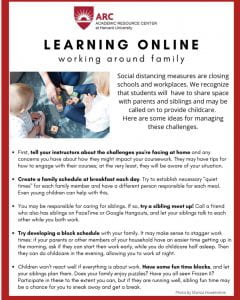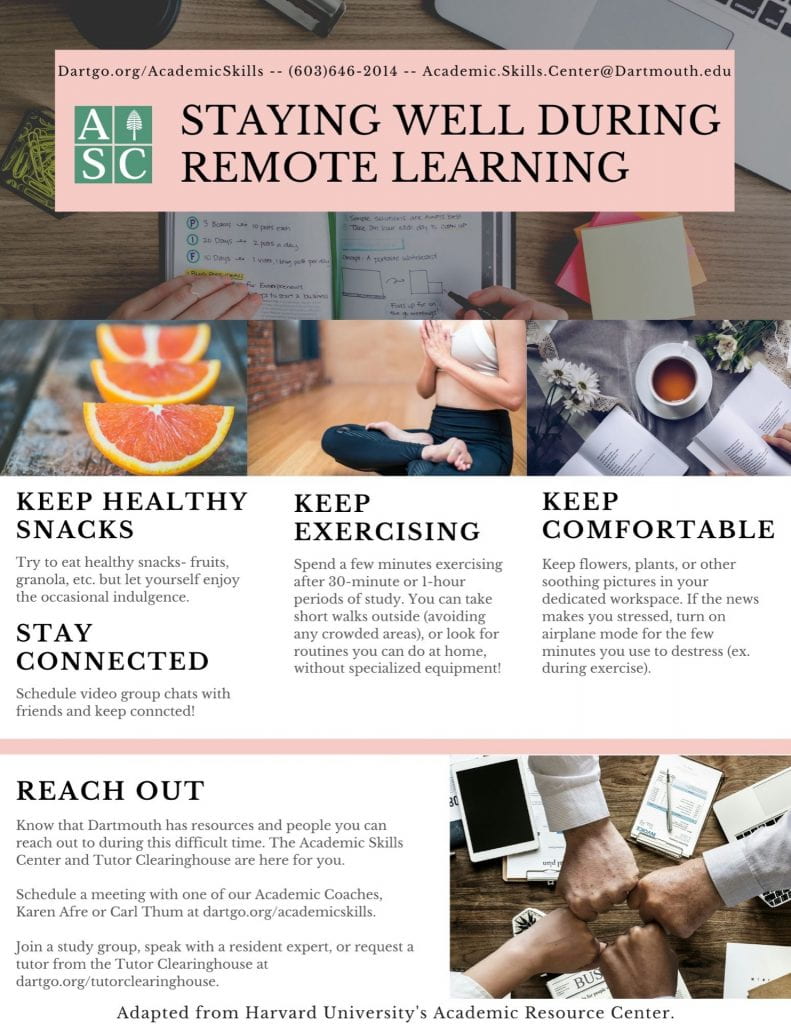Here are some remote resources that Dartmouth undergraduate students can utilize in order to make themselves feel safe, supported, and engaged throughout this remote Spring term.
Resource #1: Student Organizations & Community Engagement
Just because classes are being held virtually, for the time being, does not mean that student enrichment efforts will be lessening at Dartmouth. On the contrary, resource groups like the Division of Student Affairs and the Council on Student Organizations are still dedicated to supporting your extracurricular and social activities this spring term. They both hope that “groups will continue to foster their strong communities and bring students together during this time of uncertainty”. They readily welcome students’ ideas and feedback about how they can best support you during this remote spring term.

For those looking for ways to keep manage your club or organization remotely or for those looking for ways to stay connected with the Dartmouth Community in general during this time of isolation, the Collis Center for Student Involvement has provided resources that are sure to help you on your journey. Click here to learn more.
Resource #2: Title IX
Safety is, as always, of the utmost priority to Dartmouth. With this in mind, the Title IX Office continues to be available to all students during this remote period. Reports can still be made directly to the office via email or phone, and meetings can be held on Zoom. Dartmouth College remains committed to a safe and welcoming environment, even when that environment is virtual. Informal and formal remedies, including but not limited to no-contact orders, academic adjustments, and formal investigations are still available in a prompt and fair manner.

Resource #3: Spiritual & Emotional Support
The Tucker Center will be conducting Virtual & Confidential Pastoral Support. Feel free to speak to any of the ordained clergies in the Center about issues regarding faith, life issues, loss of a loved one, sexual assault or gender-based harassment, etc. All secular and religious undergraduates should feel free to seek out this spiritual care if they so desire. (This support should not be confused with virtual therapeutic counseling which is currently being offered through the Counseling Center at Dartmouth. Click here for some Spiritual Care Resource that you can utilize during the time of the COVID-19 pandemic.

Resource #4: Financial Assistance
The College recognizes that times are tough and money is tighter than ever for college students. Dartmouth has established an emergency fund to help students experiencing financial challenges due to the COVID-19 pandemic. The fund is an opportunity for the Dartmouth community to assist students facing difficult circumstances during this ongoing health crisis. Especially if you’ve noticed that your financial aid package was cut from subsequent terms, this fund is for you. Apply for access to that fund here.
In addition, the Finance Center staff are working remotely & are available to answer any questions you may have during their office hours of Wednesday, Thursday, & Friday: 10:00 am - 1:00 pm. Appointments for Campus Billing & DartCard Services can be arranged as necessary by emailing Campus.Billing@Dartmouth.edu.

Resource #5: ITC & General Computer Assistance
In terms of ITC and computer help, there are still campus resources that are readily available for you to use. The ITC Service Desk staff will be providing remote support for services such as technology troubleshooting and new computer setups. Please submit a support request for help with your technology. New requests will be reviewed Monday - Friday, 7:00am - 7:00pm and weekends, 8:00am - 5:00pm. Service Desk staff will schedule time with you for a phone call or remote desktop session during business hours as needed. Check the status of your requests here.
In addition, the Computer Store is open on limited business days. Check their website for more information. Please bring any equipment needing repair into the repair shop during the hours listed above. They can deliver to a Dartmouth campus address or ship to FedEx address (No PO Boxes). Orders can also be placed online or over the phone by calling 603-646-3249.

Please be mindful of your distance to others while in-store! They are adhering to CDC procedures by switching out gloves after each customer, consistently disinfecting equipment, and by no longer asking for signatures. Students in need of hardware repair should submit an Off-Campus Hardware Repair Request or work with the device manufacturer.
If you are a student without an Internet connection, Email the ITC team at Broadband.Evaluation@dartmouth.edu.


























